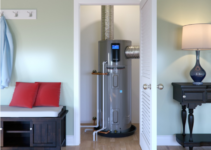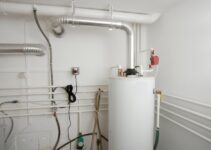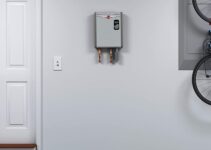Are you looking for a perfect blend of energy efficiency and superior performance from your water heater? Then you should consider buying a hybrid water heater.
This comprehensive guide will explain the advantages of these innovative appliances and provide tips to help you choose the best one. Get ready to discover the perks of this amazing technology!
Hybrid water heaters represent the perfect balance between efficiency and performance, bringing many advantages over traditional water heating systems. Hybrid technology uses two heat sources—both a gas-burning heater and an electric element. This combination raises efficiency by trapping residual heat and controlling potential temperature fluctuations.
The result is that hybrid water heaters not only reduce energy consumption but also recover hot water quickly and maintain a consistent water temperature over extended periods of time. Hybrid technology has been praised for its cost-efficient design, providing homeowners with the convenience of a traditional appliance along with the financial savings of an energy-efficient option.
In this guide we will discuss hybrid water heater technology, explore their benefits, and provide solutions to common problems associated with models on the market today. With so much to offer, hybrid models are perfect for anyone looking for value, reliability and peace of mind in their next home-heating purchase.
Explanation of what hybrid water heaters are
Hybrid water heaters are a perfect blend of efficiency and performance that combine the advantages of both tank-style storage water heaters and tankless systems. The storage container allows for the water to remain hot, while the internal heat pump extracts this existing heat energy to be used for other purposes. These units are typically 40% more efficient than traditional tanks and can reduce your monthly energy bills significantly when used in an appropriate setting.
Hybrid water heaters also provide a number of benefits that outweigh their slightly higher initial cost to purchase. Some of these include:
- Enhanced energy efficiency due to dual sources of heating
- A large capacity for hot water use even during peak demand times
- Winterset technology which senses outdoor conditions and delivers optimal performance no matter the weather
- Potential rebates or tax credits if offered by local governments or utility companies
- Less maintenance required than other types of water heater tanks
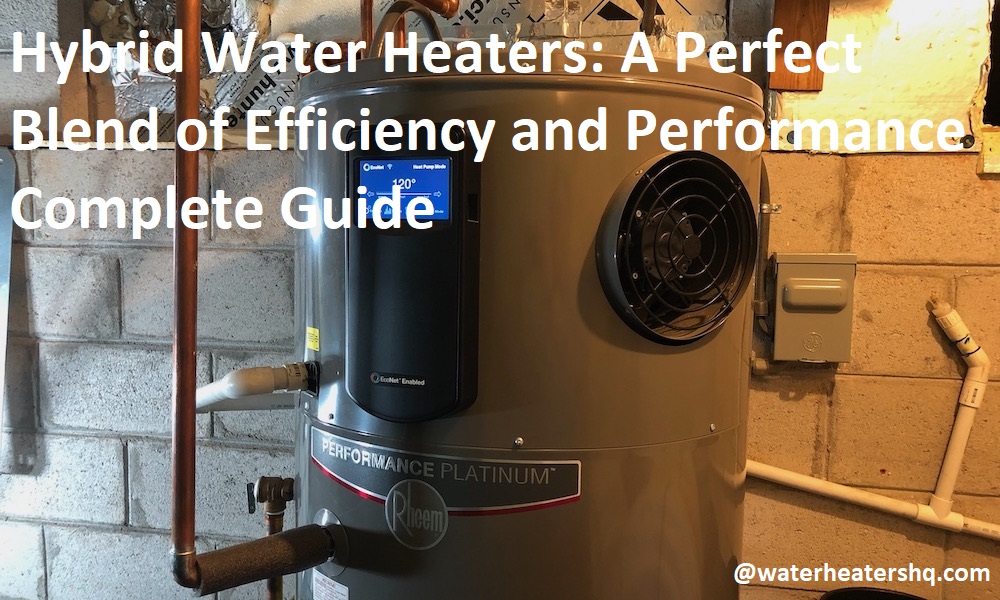
Importance of efficient water heaters
Water heaters play a critical role in our everyday lives. Without them, we wouldn’t be able to take a hot shower or make a steaming cup of tea. But traditional storage-tank water heaters are not the most efficient option when it comes to keeping our energy bills low and reducing our carbon footprints. This is where hybrid water heaters come in: they offer the perfect balance of efficiency and performance, making them an ideal solution for many households.
Hybrid water heaters combine the best aspects of storage-tank designs with newer, more efficient technology to provide an optimal experience for consumers. Unlike tankless or on-demand water heaters, which require more energy to get hot water quickly, Hybrid Water Heaters use a combination of electric and gas power that heats stored cold water in just seconds—without costing you more money each month in utility bills. Additionally, Hybrid Water Heaters often last longer than their traditional counterparts, with average life spans from 8 – 10 years and sometimes longer depending on use and maintenance guidelines followed correctly.
Moreover, compared to standard units, Hybrids are much friendlier for the environment as it requires at least 66% less energy than your regular storage tank model. This means fewer emissions released into the atmosphere over time—making Hybrids one of the safest options when it comes to looking after our planet while still getting all the benefits of modern hot water technology at home.
Purpose of the guide
This guide provides novices and experts alike with the key information to determine the best hybrid water heater system for their needs. It will provide tips to help readers choose the right system for their home, helping them save energy, reduce costs and get maximum performance from their hybrid water heater.
It is also important to understand how different types of hybrids work, what size and type of tank they need and how they can be maintained and serviced. In addition, this guide contains information on available rebates, financing options, and installation guidelines so readers can make informed decisions on their appliance investments.
With comprehensive coverage of all aspects related to hybrid water heaters, this guide is a must-have resource for anyone looking to upgrade their existing water heating system or purchase a new one.
Benefits of Hybrid Water Heaters
Hybrid water heaters are an excellent choice for households looking to boost their hot water production while reducing energy bills. These units offer several advantages over traditional tank-style units, including higher efficiency ratings and versatility. Here are some more of the key benefits of hybrid water heaters:
- Higher Efficiency Ratings: The modern features and components in hybrid models increase their energy efficiency when compared to traditional tank-style hot water systems. This can result in significant savings on monthly heating bills, as well as lessen the environmental impact of operating a water heater system.
- Hot Water On Demand: Hybrid systems have onboard storage tanks that help provide always-on hot water instead of only providing it when needed like a tankless range heater. This allows the user to enjoy greater convenience and peace of mind knowing that hot water is always available when used correctly.
- Versatility: Many hybrid models feature advanced components such as built-in recirculation pumps that help reduce wait times at faucets and showers by instantaneous access to hot waters stored in the unit itself. Additionally, some users may benefit from a dual or multistage heating coil system for even greater output depending on their usage requirements.
- Increased Longevity: Thanks to their efficient operation and modern components, hybrid heaters can often outperform traditional tank-type units in terms of longevity and overall life cycle cost savings due to less need for repairs or replacement over time. This makes them an ideal long-term investment for many household uses.
Energy efficiency and cost savings
Hybrid water heaters are highly efficient systems that combine the options of a tank and a tankless water heater, with the goal of offering an appliance option that puts money back into your pocket. These systems reduce costs associated with operation and home comfort, while improving energy efficiency. They are available in several configurations, including point-of-use heaters before being released into your home’s water supply main, to whole house style units. Those interested in energy efficiency and cost savings should consider hybrid water heaters as an alternative to traditional models.
Tankless fans typically rave about the elimination of standing water kept hot inside of a tank system – they call it “on-demand hot water at its finest” because you get hot water only when you need it without any standby loss. This means hardly any wasted energy in the process and lower monthly utility bills. Hybrid Heaters save up to 50% on annual operating costs compared regular electric storage tank systems due to their improved thermal insulation and better ability to reduce operating temperature losses in comparison to standard electric systems or gas ones for that matter.
The other key benefit is fast recovery times: meaning it does not take long for heated waters from a hybrid heater to reach a comfortable temperature for use – no more waiting long periods for showers or filling up basins with cold water first so you don’t scald yourself! Finally, maintenance is low on hybrid heaters (yearly flushing typically) making them cost effective solutions over time when looking at total system ownership.
Environmental benefits
Hybrid water heaters provide a variety of environmental benefits because they are the most energy efficient on the market. Statistics from the U.S. Department of Energy show that switching to a hybrid water heater can lead to up to $1,400 in cost savings over the span of 10 years for households that use 50 gallons or more per day.
These types of systems also extend the life expectancy of appliances as well as reduce emissions due to fewer trips to and from a home’s hot water valves, leading to less turbulence and wear and tear on pipes. Additionally, hybrid systems add almost no additional air-quality pollutants when compared with traditional water heating options, making them an excellent choice for those who are looking to reduce their personal carbon footprint.
Installation of Hybrid Water Heaters
Installing a hybrid water heater can be a complicated process, so it’s important to understand the steps involved and have all the necessary tools in place before starting the job. Depending on your heater’s specific needs and your chosen setup, certain steps may need to be altered or omitted altogether. You must also make sure to refer to the manufacturer’s instructions and check local building codes before beginning any installation.
Safety is of utmost importance when installing any appliance, particularly one that uses electricity and water. As such, if you do not feel comfortable attempting an installation yourself, it is recommended that you bring in a professional plumber or electrician who has experience working with hybrid water heaters.
The following sections outline some typical guidelines for installing a hybrid water heater:
- Location Selection
- Supply Line Connection
- Venting of Exhaust Gases
- Electricity Connections
- Thermostat Setup
- Heat Pump Installation
- Inspection and Testing
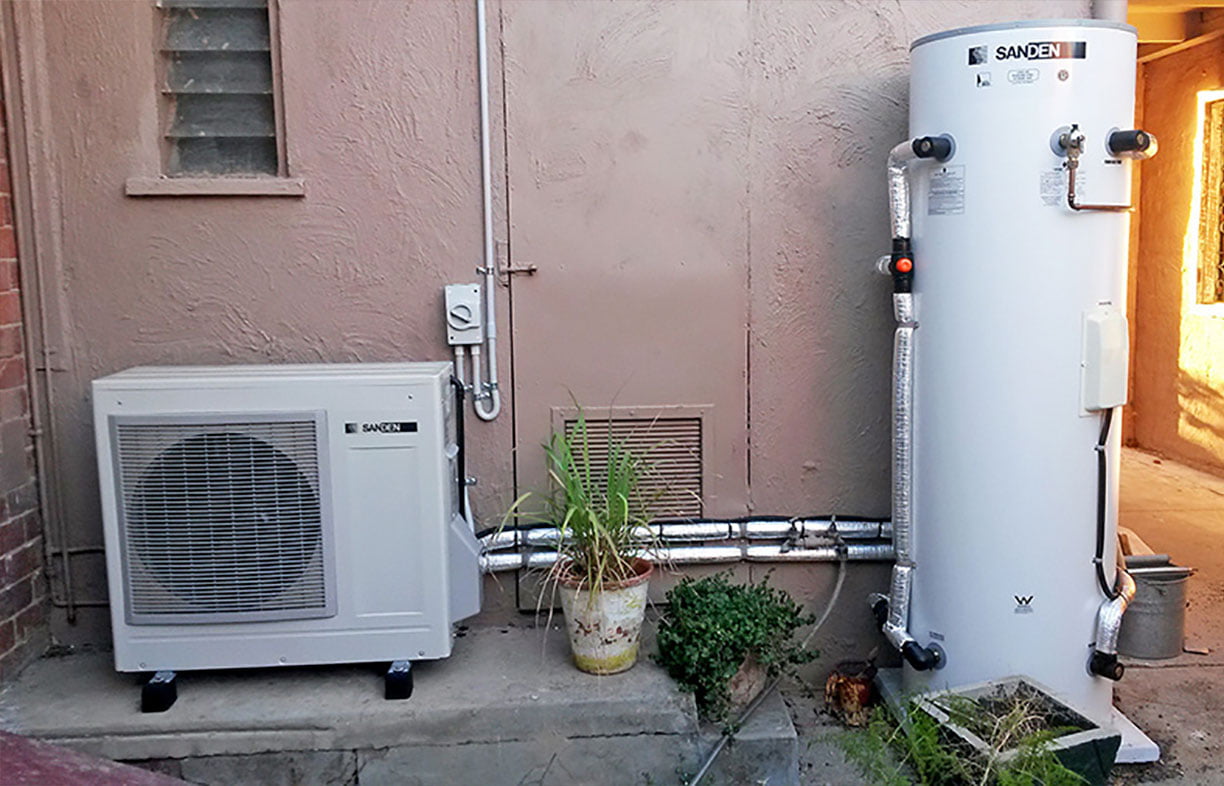
Professional installation
Professional installation is the best way to guarantee that your hybrid water heater will run efficiently and will meet all local requirements for safety and code compliance.
The installation process usually involves disconnecting of any gas or electric lines connected to your existing system and then making sure that all the components are installed properly. An experienced professional should check for proper venting, including checking for any hazardous combustible gases that may be present near your installation location and correcting them if necessary.
All remaining components should then be tested to make sure everything is running smoothly. A follow-up visit from an HVAC technician may also be necessary if there are any problem areas or the system requires any additional attention before it can safely function.
Necessary tools and equipment
Before you install a hybrid water heater, it is important to ensure that you have the necessary tools and equipment. It is also important to understand that the installation of a hybrid water heater requires more work than a traditional water heater.
First of all, you will need to make sure that you have all of the basic tools such as wrenches, screwdrivers, and an adjustable wrench, as well as safety gear like goggles and gloves. The job may also require a few specialty items such as thermal anti-seize compound or Teflon tape. Additionally, if you plan on working with electric wiring then make sure that you have electrician’s wire cutters and strippers as well.
Additionally, depending on the model of hybrid water heater that you are installing and your local code requirements, there may be some unique tools and supplies necessary for installation such as an expansion tank or an expansion joint for larger tanks. Make sure to check what exactly is needed before starting your project.
Step-by-step installation process
Hybrid water heaters offer an ideal balance of convenience, efficiency, and performance. With superior temperature resting capabilities and programmability options, these units are ideal for large families or households that require abundant hot water on demand. Installing a hybrid water heater is not a difficult task, however, it’s important to take the necessary safety precautions and follow the step-by-step installation instructions correctly.
Step 1: Locate the Best Spot for Installation
The installation of a hybrid water heater should always happen in an area that is well-vented and properly supported – usually near the main electrical panel or close to the laundry room. You also want to ensure there is no combustible material near the heater – as this could lead to combustion or fire hazards.
Step 2: Run Plumbing Connections
Next you need to make plumbing connections from your house’s cold/hot water lines to your brand new hybrid unit. It’s important to use copper tubing with no kinks when making these connections as kinks will lead to decreased performance. Use PEX piping if needed once everything is connected properly you’ll be ready to charge up your hybrid water heater! Don’t forget to put a washer or gasket on both sides of the connections to caulk everything securely.
Step 3: Install Voltage Protection Device
OK you’re almost there! Before powering up your system, it’s important to install a voltage protection device (VPD). This device helps prevent dangerous spikes in voltagesenttothewater heater which may cause the device to overheat and stop working as expected. It also protects against water damage and provides valuable insurance against unexpected discharge caused by electrical shocks or fires. Most modern hybrid athletes are equipped with this feature right out of the box so all that’s left is to connect the VPD to the electric side of the water setup. The manual should have clear instructions on the shape and screws that need to be tightened– so just follow them to properly secure it.
Maintenance of Hybrid Water Heaters
Regular maintenance of your hybrid water heater is essential to ensure peak performance and long-lasting efficiency. Routine inspections by a qualified plumber or HVAC technician will give you the best results. To keep your hybrid water heater running at its best and prolong its service life, here are a few suggested maintenance tasks and tips:
1.Check for heat exchanger leaks, corrosion, or damage regularly.
2.Ensure that all electrical connections are secure and in proper working order.
3.Test the pressure relief valve on an annual basis to make sure it’s functioning properly by attaching a hose to it and releasing any built up pressure.
4.Inspect the exterior of the unit for signs of metal fatigue or damage such as cracks, rusting, broken parts, etc., checking the gasket seals around the access panels for damage as well.
5.Clean any sediment out of the tanks and flush out any dirt or debris that has built up in any components throughout the unit including heat exchangers, burners, condensate traps etc., once per year if possible or every two to three years as needed depending upon usage levels/conditions.
6.Conduct regular visual inspections of all accessible components including burner assemblies, combustion chambers and sensors; looking for corroded parts or loose connections indicating possible gas leaks which should be addressed immediately by a qualified technician for safety reasons if noted during an inspection
7.Replace anode rods every three to five years depending upon usage levels/conditions.
Regular maintenance requirements
Regular maintenance is key to ensuring your hybrid water heater operates efficiently and performs optimally. Properly maintained and serviced, hybrid electric models have a lifespan of around 10 years, while gas hybrids last up to 12 years. Important elements of its routine service include checking the condensate drain, looking out for potential refrigerant leaks and replacing the sacrificial anode rod.
Inspecting the condensate drain should be done at least twice each year. It’s important for owners to check for clogs that can lead to water damage or bacterial growth. To prevent leaks from occurring it is necessary to ensure all fittings are secure and intact. Connections must be checked on a regular basis to ensure they are properly sealed; if any fittings appear cracked or worn then they should be replaced as soon as possible.
The sacrificial anode rod should also be inspected periodically and replaced when it has corroded past a certain point, usually about three-quarters of its original size. Anodes effectively sacrifice themselves in order to protect the tank; without this rod your tank could rust prematurely and must be replaced sooner than originally planned.
Finally, if possible it is best not to mix different brands of coolant or refrigerant additives together; doing so could create a reaction that compromises system safety or efficiency.

Conclusion
The decision of selecting a water heater is an important one, and homeowners should take their time to explore all the options available.
Hybrid water heaters offer an optimal balance of efficiency and performance, providing homeowners with hot water on demand at a reasonable cost. And as technology continues to evolve, hybrid systems could become the go-to choice for many American households.
That is why it is crucial for consumers to keep up with advances in water heating technology and make sure they’re getting the most efficient system for their needs.
FAQ’S
What is the efficiency of a hybrid water heater?
The efficiency of a hybrid water heater can vary depending on the model and manufacturer, but it typically ranges from 250-350% or higher.
Are hybrid hot water heaters more efficient?
Yes, hybrid hot water heaters are generally more efficient than traditional tank-style water heaters or even some tankless water heaters.
What is the benefit of a hybrid water heater?
The main benefit of a hybrid water heater is energy efficiency, which can result in lower energy bills over time compared to other types of water heaters.
What is the most efficient mode for hybrid water heater?
The most efficient mode for a hybrid water heater is typically the heat pump mode, which uses electricity to transfer heat from the surrounding air or ground to heat the water.
What is the best efficiency hot water system?
The best efficiency hot water system can vary depending on individual needs and preferences, but a hybrid water heater or a solar water heater can be among the most efficient options.
What makes a water heater high efficiency?
A water heater is considered high efficiency if it uses less energy to heat water compared to traditional models, often through the use of advanced technologies such as heat pumps or condensing gas burners.
Is a hybrid water heater more efficient than a gas water heater?
Yes, a hybrid water heater is generally more efficient than a standard gas water heater, which can lose heat through the exhaust and requires a pilot light to stay lit.
Why is it called a hybrid water heater?
A hybrid water heater is called so because it combines two different technologies, typically a conventional heating element and a heat pump, to achieve higher energy efficiency.
Is hybrid water heater worth it?
A hybrid water heater can be worth it for those looking to save money on energy bills in the long run, but the upfront cost can be higher compared to traditional water heaters.
What is the highest efficiency heating?
The highest efficiency heating systems can vary depending on the application, but some examples include geothermal heat pumps, condensing gas furnaces, and biomass boilers.
See Also:
- Best 50-gallon gas water heater
- Best 75 gallon gas water heater
- Best 80 gallon electric water heater
- Best 110 volt tankless water heater for shower
- Best electric tankless water heater
